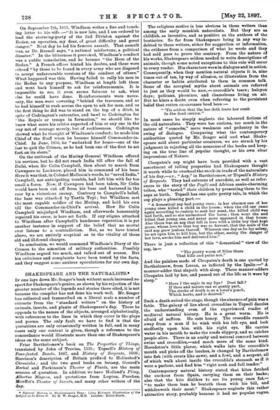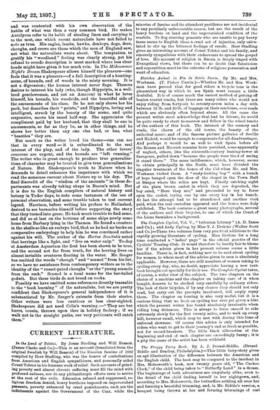SHAKESPEARE AND THE NATURALISTS.* IF one lays down Mr. Seager's
book without much increased re- spect for Shakespeare's genius, as shown by his rejection of the greater number of the legends and stories there cited, it is not because the compiler has not done his work well. Mr. Seager has collected and transcribed on a liberal scale a number of extracts from the " standard writers " on the history of animals, insects, and plants of Shakespeare's day. These he appends to the names of the objects, arranged alphabetically, with references to the lines in which they occur in the plays and poems. The only fault we have to find is that the quotations are only occasionally written in full, and in many cases only one context is given, though a reference to the concordance would illustrate more than one of Shakespeare's ideas on the same subject.
Friar Bartholomew's book on The Properties of Things, translated by John of Trevisa, 1535 ; Topsell's History of Four-footed Beasts, 1607, and History of Serpents, 1608; Harrison's description of Britain prefixed to Holinshed's Chronicles ; and the two good books on botany, Gerard's Herbal and Parkinson's Theater of Plants, are the main sources of quotation. In addition we have Holland's Pliny, Albertus Magnus, and quotations from Lupton, Purchas, Mouffet's Theater of Insects, and many other writers of the day.
• Natural History in Shakespeare's Time being Ektrarts Illustrative of the Subject as he Knew It. By II. W. Saner, Id.B. London: Elliot Stock.
The religious motive is less obvious in these writers than among the early monkish naturalists. But they are as childish, as inventive, and as positive as the authors of the bestiaries. So far from Shakespeare being in any way in- debted to these writers, either for suggestion or information, the evidence from a comparison of what he wrote and they had said goes to prove the contrary. From the nature of his works, Shakespeare seldom needed to write descriptions of animals, though some noted exceptions to this role will occur to every reader. His characters were in dialogue and in action. Consequently, when they mention natural objects it is, nine times out of ten, by way of allusion, or illustration from the character or habits attributed to them in common talk. Some of the accepted myths about animals are referred to just as they would be now,— crocodile's tears; halcyon days; pelicans, phoenixes, and chameleons living on air. But he hints a doubt even when referring to the persistent belief that rotten ox-carcases bred bees :—
" 'Tis seldom that the bee doth leave her comb In the dead carrion."
In most cases he simply neglects the laboured fictions of the old naturalists. . They were too curious, too much in the nature of "conceits," mere weakness and pedantry in the swing of dialogue. Comparing what the contemporary authorities quoted by Mr. Seager said and what Shake- speare said about particular creatures, we are struck by his judgment in rejecting all the nonsense of the books and keep- ing on the true line of popular thought, or his own clear impressions of Nature.
Cleopatra's asp might have been provided with a vast assortment of telling properties had Shakespeare thought it worth while to overhaul the stock-in-trade of the naturalists of his day,—s.v., "Asp," in Bartholomew, or Topsell's History of Serpents. They had columns of anecdote, as well as refer- ences to the story of the Psylli and African snake-charming tribes, who "tested" their children by presenting them to the asps at birth. Topsell has one quite pretty tale, in which the asp plays a pleasing part :— " A domestical asp had young ones ; in her absence one of her young ones killed a child in the house ; when the old one came again according to custom to seek her meat, the killed child was laid forth, and so she understood the harm ; then went she and killed that young one, and never more appeared in that house. Also there was an asp that fell in love with a little boy that kept geese, whose love to that boy was so fervent, that the male of the said asp grew jealous thereof. Whereon one day as he lay asleep, he set upon him to kill him, but the other, seeing the danger of her love, awoke him and delivered him."
There is just a reflection of this "domestical" view of the
asp, in—
"The pretty worm of Nilus there That kills and pains not."
And the painless mode of Cleopatra's death is one quoted by Bartholomew, from Lucan, as inflicted by the Ipalis:—" A manner-adder that slayeth with sleep. These manner-adders Cleopatra laid by her, and passed out of the life as it were by sleep."
"Have I the aspic in my lips ? Dost fall ? If thou and nature can so gently part, The stroke of death is as a lover's pinch, Which hurts, and is desired."
Such a death suited the stage, though the absence of pain was a fable. The galaxy of lies about crocodiles in Topsell dazzles the understanding even of the experienced reader of mediaaval natural history. He is a great worm. He is afraid of saffron. He eats honey. The crocodile runneth away from a man if he wink with his left eye, and look etedfastly upon him with his right eye. He carries water in his mouth to make the roads slippery, and so catches people alive. There is an amity and natural concord between swine and crocodiles,—and much more of the same kind. Herodotus's little plover, which walks into the crocodile's mouth and picks off the leeches, is changed by Bartholomew into fish (with crests like saws), and a fowl, and a serpent, all of which walk about inside the crocodile's stomach as if it were a parlour, and find him "right nesh and full tender."
Contemporary natural history stated that kites fetched the cuckoos from Spain, carrying them on their backs; also that the kite dislikes to see its young ones fat,— " to make them lean he beateth them with his bill, and withdraweth their meat." Shakespeare neglects this rather attractive story, probably because it had no popular vogue,
and was contented with his own observation of the habits of what was then a very common bird. He makes Antolycus refer to its habit of stealing linen and carrying it to the nest, one which recent naturalists have not failed to note as true. His eagles, lambs, hawks, donkeys, dogs, deer, choughs, and crows are those which the men of England saw, not what the naturalists wrote about. The temptation to gratify his " woodland " feeling was clearly strong, yet his refusal to overdo description is most marked where less clear heads might have given it too much rein. In The Midsummer Night's Dream Shakespeare allows himself the pleasure—one feels that it was a pleasure—of a full description of a hunting- scene, of hounds, and of woods in the misty morning. It is not a digression ; the human interest never flags. Theseus desires to interest his lady (who, though Hippolyta, is a well- bred gentlewoman, and not an Amazon) in what he loves himself, his hounds, his woodside, and the beautiful side of the amusements of his class. So he not only shows her his pack, but describes their " points," and Hippolyta, loving and intelligent, struck by the beauty of the scene, and quite responsive, meets his mood half-way. She appreciates the compliment paid by her husband, that they shall be one in amusements, so far as they be, as in other things, and he shows her better than any one else had, or has, what " beauties " they are.
But much as the writer loved his theme—one can see that in every word — it is subordinated to the real interest of the play, and of the lady. The other lovers' concerns are urgent, and the hounds are " left running." The writer who is great enough to produce true generalisa- tions of character may be trusted to give true generalisations of Nature. But Shakespeare's truth to Nature when he descends to detail enhances the impatience with which we read the nonsense current about Nature up to his day. The final discredit of the " wisdom of the ancients " in these de- partments was already taking shape in Bacon's mind. But it is due to the English compilers of natural history and botany in Tudor days, to note some instances of the use of personal observation, and some trouble taken to test current legend. Harrison, before writing his preface to Holinshed, desired to see barnacles himself before supporting the story that they turned into geese. He took much trouble to find some, and did so at last on the bottoms of some ships newly come home from Barbary lying in the Thames. He found a creature in the shells so like an embryo bird, that as he had no books on comparative embryology to help him he was convinced rather against his will. The author of the Hortus Sanitatis noted that herrings like a light, and "live on water only." To-day at Amsterdam Aquarium the first has been shown to be true, and the second not far from truth, for the herring lives on almost invisible creatures floating in the water. Mr. Seager has omitted the words " though " and " scamel "from his list, so we have no assistance from contemporary writers as to the identity of the " russet-pated choughs "or the " young scamels from the rock." Scamel is a local name for the bar-tailed godwit. But these birds de not breed on rocks.
Possibly we have omitted some references directly traceable to the " book learning " of the naturalists, but we are pretty confident that Shakespeare's general independence of it is substantiated by Mr. Seager's extracts from their stories. Other writers were less cautious or less clear-sighted. Shakespeare did not need Celia's warning :—" They are but burrs, cousin, thrown upon thee in holiday foolery ; if we walk not in the straight paths, our very petticoats will catch them."







































 Previous page
Previous page